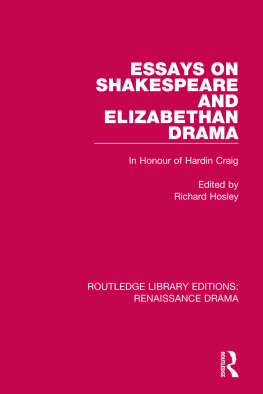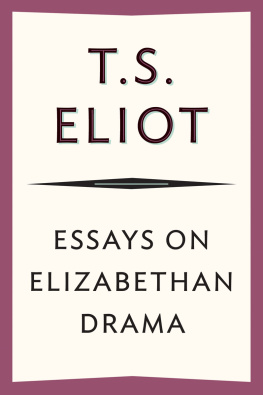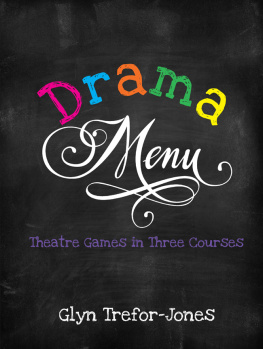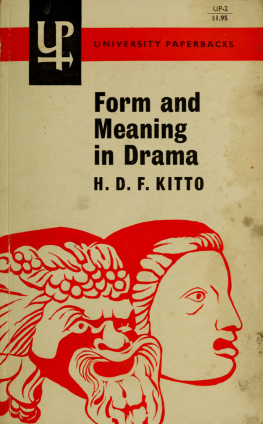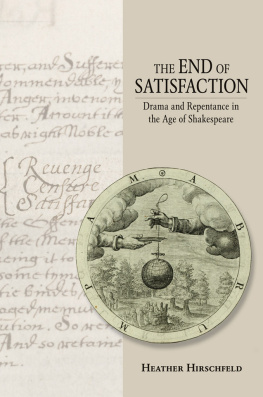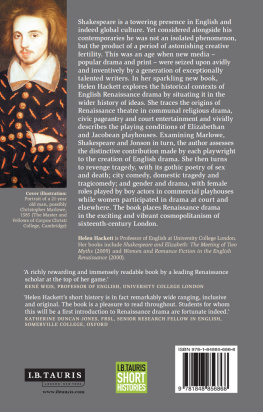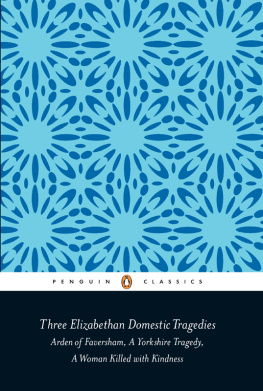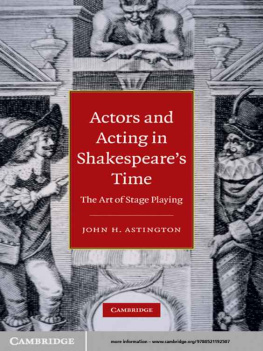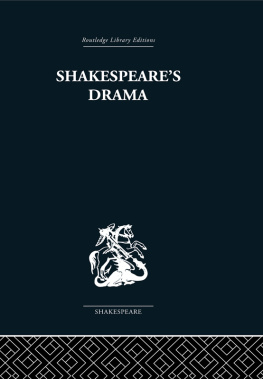ROUTLEDGE LIBRARY EDITIONS:
RENAISSANCE DRAMA
Volume 5
ESSAYS ON SHAKESPEARE AND ELIZABETHAN DRAMA
Essays on Shakespeare and Elizabethan Drama
In honour of Hardin Craig
Edited by
Richard Hosley
First published in 1963 by Routledge & Kegan Paul Ltd
This edition first published in 2017
by Routledge
2 Park Square, Milton Park, Abingdon, Oxon OX14 4RN
and by Routledge
711 Third Avenue, New York, NY 10017
Routledge is an imprint of the Taylor & Francis Group, an informa business
1963 Richard Hosley
All rights reserved. No part of this book may be reprinted or reproduced or utilised in any form or by any electronic, mechanical, or other means, now known or hereafter invented, including photocopying and recording, or in any information storage or retrieval system, without permission in writing from the publishers.
Trademark notice : Product or corporate names may be trademarks or registered trademarks, and are used only for identification and explanation without intent to infringe.
British Library Cataloguing in Publication Data
A catalogue record for this book is available from the British Library
ISBN: 978-1-138-71372-7 (Set)
ISBN: 978-1-315-19807-1 (Set) (ebk)
ISBN: 978-1-138-71325-3 (Volume 5) (hbk)
ISBN: 978-1-315-19912-2 (Volume 5) (ebk)
Publishers Note
The publisher has gone to great lengths to ensure the quality of this reprint but points out that some imperfections in the original copies may be apparent.
Disclaimer
The publisher has made every effort to trace copyright holders and would welcome correspondence from those they have been unable to trace.
Essays On Shakespeare and Elizabethan Drama
In honour of Hardin Craig
Edited by
RICHARD HOSLEY
First published in England 1963
by Routledge & Kegan Paul Ltd
Broadway House, 68-74 Carter
Lane London, E.C.4
Printed in Great Britain
by Lowe & Brydone ( Printers ) Ltd
London, N. W.10
Copyright 1962 by
THE CURATORS OF THE UNIVERSITY OF MISSOURI
No part of this book may be reproduced in any form without permission from the publisher, except for the quotation of brief passages in criticism
Contents
Guide
by RICHARD HOSLEY
HARDIN CRAIG was born on his father's farm near Owensboro, Kentucky, on 29 June 1875. His father, Robert Craig, a native of Ayr shire, Scotland, had migrated to Kentucky in 1850, and his mother, Mary Jane McHenry Craig, came of a Colonial family which included a member of Washington's staff, Colonel John Hardin. In 1906 Craig married Miss Gertrude Carr of Ashby, Massachusetts. Their son, Hardin Craig, Jr., was born in 1907 and is now a professor of history and the librarian at Rice University. Through him, Craig has two grandsons.
In 1897 Craig received his A.B. degree from Centre College, Kentucky, and in 1898 he began graduate study at Princeton University. In the summers of 1899 and 1900 he studied also at the University of Chicago, where he came under the influence of John Matthews Manly. At Princeton he worked under Thomas Marc Parrott, taking his Ph.D. degree in 1901. He then taught successively at Princeton (1901-10, with a year of study at Exeter College, Oxford, in 1902-3), the University of Minnesota (1910-19, with service as a U.S. Army officer in 1917-18), the State University of Iowa (1919-28, as Head of the English Department), and Stanford University (1928-42, with an interval as Visiting Professor of English at the University of North Carolina in the winter of 1935). A detailed account of Craig's career down to 1940 may be found in the biographical essay by Rudolf Kirk in Renaissance Studies in Honor of Hardin Craig (Stanford University Press, 1941).
In 1940 Professor Craig was asked to continue teaching at Stanford beyond the customary retirement age of sixty-five. Thus began his second career, which this second Festschrift especially honors. It has been as rich in teaching and scholarship as the first, but more lonely, for Mrs. Craig died in 1941. The following year Craig accepted an appointment as Professor of English at the University of North Carolina, where he remained until 1949, except for the spring of 1944 which he spent as Walker-Ames Visiting Professor of English at the University of Washington. During the North Carolina period Craig produced several works in the field of the Renaissance: his edition of an Elizabethan manuscript translation of The Prince (1944), An Interpretation of Shakespeare (1948), and his literary history of the English Renaissance (1950). But, characteristically, he brought out also works of more general intellectual and academic interest: Literary Study and the Scholarly Profession (1944) and Freedom and Renaissance (1949). During this period he continued to edit the annual Renaissance bibliography for Studies in Philology, as he had done since 1925 and was to do until 1950; and in 1944, in collaboration with Allan Gilbert of Duke University, he founded the Southeastern Renaissance Conference. In 1947 he spoke at the International Shakespeare Conference sponsored by the Shakespeare Institute of the University of Birmingham; and in 1948 he was elected a Fellow of the Royal Society of Literature and gave a talk on Shakespeare over the BBC. In the following year he gave a series of lectures at the Shakespeare Institute Summer School in Stratford-upon-Avon.
In 1949 Hardin Craig accepted the position of Visiting Professor of English at the University of Missouri, where he taught until 1960. Early in this period he finished his edition of the complete works of Shakespeare (1951), and then, stimulated by his popular graduate course in the medieval drama, he returned to his scholarly interests of thirty years earlier and wrote English Religious Drama of the Middle Ages (1955). In 1957 he brought out a second edition of Two Coventry Corpus Christi Plays, which he had edited originally for the Early English Text Society in 1902. And toward the end of the Missouri period he wrote three books that amply testify to his continuing keen interest in a variety of special fields: Woodrow Wilson at Princeton (1960), New Lamps for Old: A Sequel to The Enchanted Glass (1960), and A New Look at Shakespeare's Quartos (1961).
In 1960 Craig became Scholar in Residence at Stephens College, where he now teaches and writes while retaining his association with the University of Missouri as Professor Emeritus of English. Thus he is still, as in earlier periods, an active participant in the thoughtful life both of his community and of the wider world beyond the immediate horizon. The authors of the following essays, and his colleagues at the University of Missouri, here pay tribute to Hardin Craig's enduring achievement and to the spirit of inquiry that has animated it from the beginning.
by RICHARD SOUTHERN
TWO THINGS ABOUT the Tudor interludes have perhaps hindered investigators from making full use of them as sources of the technique for staging Elizabethan plays. The first is the uncertainty of their dates, and the second the uncertainty of their place or places of performance. Upon examination, however, neither of these difficulties proves to be a final bar for at any rate some preliminary study of the subject.

